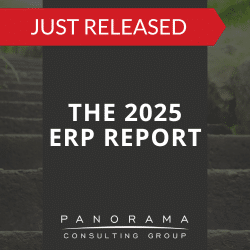Automation is a key element of digital transformation, and it’s more prevalent than ever. According to one report, 92% of large companies are increasing their investments in data and artificial intelligence (AI). The same report found that these companies are already seeing returns on the AI investments they’ve made to date.
The benefits of AI in supply chain management cannot be understated. This technology is improving operational efficiencies, lowering costs, and optimizing data integration at every touchpoint.
7 Benefits of AI in Supply Chain Management
1. Access to Low-Cost Suppliers
AI-powered supply chain systems allow organizations to identify reputable, low-cost suppliers. This helps them keep operations lean without sacrificing quality, speed, or service.
With access to these real-time data insights, organizations can also optimize their supplier and vendor communications and coordinate orders more effectively.
2025 Clash of the Titans
SAP, Oracle, Microsoft, and Infor each have a variety of systems that can support data-driven decision-making. We surveyed customers of these four vendors to find out what their selection and implementation process was like.
2. The Ability to Search for Items and Part Specifications
Gone are the days when organizations had to manually find product information via a database. With AI, they can now quickly search for and view item dimensions and other specifications.
For example, organizations can identify individual part specifications and create detailed product catalogs in a matter of minutes.
3. Enables You to Identify Freight Lanes and Low-Cost Pricing
Organizations are constantly looking for ways to conserve costs and improve service. AI can help them get there.
Take shipping, for instance. Using AI technology, business leaders can identify economical freight solutions across channels. This helps them locate the best routes for shipments and access predictions about potential issues, such as delays or heavy traffic.
AI can even be used to understand the impact of other outside factors, such as produce season. If an organization has an AI-enabled SCM system, employees can be automatically alerted when produce season is approaching and informed of how this might affect truck availability and response times.
Key Benefit to Share With Your Boss: When you know about a problem ahead of time, you can deploy workarounds to protect against costly setbacks.
4. The Ability to Model Historical Demand and Forecast Sales
Staying one step ahead of customer demand is one of the primary ways organizations optimize their operations and control their inventory.
Historical modeling and sales forecasting used to be a mostly manual task. This made it difficult to glean actionable insights from available data. The task required a significant investment of time as employees dug through old records and numbers to create visual representations of patterns and trends.
Now, team leaders can teach AI to model historical sales demand to predict what may happen in the future. With AI-powered feedback, companies can create algorithms that examine data at the most granular level. This allows them to look at factors such as macroeconomic conditions and understand how they may impact product demand.
5. Enables You to Identify Obstacles Early
With the increased data availability that AI affords, organizations can identify obstacles that might impede operational improvements. Examples of these obstacles include:
- Product or item data gaps
- Inaccurate logistics documentation
- Shipping or delivery route inaccuracies
- Forecast and demand management errors
AI applications use advanced data analytics to monitor systems in real-time. Then, they report potential errors and supply chain pain points so users can take action before they develop into bigger issues.
6. Enables You to Leverage ChatGPT
In the realm of AI for business, arguably no topic has garnered as much interest as ChatGPT. This program is designed to comprehend natural language and generate responses that replicate human interaction.
While time will tell exactly how this technology will transform the manufacturing realm and other industries, early applications show that it has the potential in areas such as:
- Automating workflows
- Gathering data
- Managing inventory levels
- Streamlining supply chain operations
- Communicating with stakeholders
In addition to leveraging ChatGPT to improve operational efficiency, organizations can use the technology to improve supplier and partner communication. This can help them seamlessly coordinate the delivery of raw materials and finished goods.
7. The Ability to Utilize Blockchain Technology
Organizations are also exploring the various ways that blockchain technology can optimize supply chain management, especially in terms of visibility and transparency.
As the digital record-keeper behind Bitcoin and similar cryptocurrency networks, blockchain technology can help companies deliver their products in a faster and more cost-effective manner. Blockchain also creates a traceable record of each product, improving partner coordination.
Using the blockchain, companies can complete transactions securely and directly, without the use of a third party. With each transaction, the blockchain will record relevant information, such as:
- Price
- Location
- Date
- Quality
- Certification
All parties within the supply chain have access to the same information, which improves data accuracy. It can also improve integrations between financial and logistics services, which simplifies stakeholder collaboration.
AI is More Accessible Than Ever
The field of AI is rapidly changing and expanding. Today, you’ll find AI everywhere you turn, from your favorite search engine to your company’s CRM system.
Implementing one of the top manufacturing ERP systems, or another enterprise system with embedded AI, can help you improve your supply chain operations both operationally and financially. With smarter tools at their fingertips, employees can work more effectively, backed by accessible and relevant data.
To learn more about the future of artificial intelligence in business and the benefits of AI in ERP, contact our enterprise software consultants below.





![7 Benefits of AI in Supply Chain Management [Do You Have FOMO Yet?]](https://www.panorama-consulting.com/wp-content/uploads/2018/10/benefits-of-ai-in-supply-chain.png)







